- Home
- Edith Wharton
Tales of Men and Ghosts Page 7
Tales of Men and Ghosts Read online
Page 7
Mrs. Grew had never learned to know better; but Mr. Grew had discovered his error before Ronald was out of school. He read it first in a black eye of his boy’s. Ronald’s symmetry had been marred by the insolent fist of a fourth former whom he had chastised for alluding to his father as “Old Buckles;” and when Mr. Grew heard the epithet he understood in a flash that the Buckle was a thing to blush for. It was too late then to dissociate his name from it, or to efface from the hoardings of the entire continent the picture of two gentlemen, one contorting himself in the abject effort to repair a broken brace, while the careless ease of the other’s attitude proclaimed his trust in the Secure Suspender Buckle. These records were indelible, but Ronald could at least be spared all direct connection with them; and from that day Mr. Grew resolved that the boy should not return to Wingfield.
“You’ll see,” he had said to Mrs. Grew, “he’ll take right hold in New York. Ronald’s got my knack for taking hold,” he added, throwing out his chest.
“But the way you took hold was in business,” objected Mrs. Grew, who was large and literal.
Mr. Grew’s chest collapsed, and he became suddenly conscious of his comic face in its rim of sandy whiskers. “That’s not the only way,” he said, with a touch of wistfulness which escaped his wife’s analysis.
“Well, of course you could have written beautifully,” she rejoined with admiring eyes.
“ Written? Me!” Mr. Grew became sardonic.
“Why, those letters—weren’t they beautiful, I’d like to know?”
The couple exchanged a glance, innocently allusive and amused on the wife’s part, and charged with a sudden tragic significance on the husband’s.
“Well, I’ve got to be going along to the office now,” he merely said, dragging himself out of his rocking-chair.
This had happened while Ronald was still at school; and now Mrs. Grew slept in the Wingfield cemetery, under a life-size theo-logical virtue of her own choosing, and Mr. Grew’s prognostications as to Ronald’s ability to “take right hold” in New York were being more and more brilliantly fulfilled.
II
RONALD obeyed his father’s injunction not to come to luncheon on the day of the Bankshires’ dinner; but in the middle of the following week Mr. Grew was surprised by a telegram from his son.
“Want to see you important matter. Expect me tomorrow afternoon.”
Mr. Grew received the telegram after breakfast. To peruse it he had lifted his eye from a paragraph of the morning paper describing a fancy-dress dinner which had taken place the night before at the Hamilton Gliddens’ for the house-warming of their new Fifth Avenue palace.
“Among the couples who afterward danced in the Poets’ Quadrille were Miss Daisy Bankshire, looking more than usually lovely as Laura, and Mr. Ronald Grew as the young Petrarch.”
Petrarch and Laura! Well—if anything meant anything, Mr. Grew supposed he knew what that meant. For weeks past he had noticed how constantly the names of the young people appeared together in the society notes he so insatiably devoured. Even the soulless reporter was getting into the habit of coupling them in his lists. And this Laura and Petrarch business was almost an announcement…
Mr. Grew dropped the telegram, wiped his eye-glasses, and re-read the paragraph. “Miss Daisy Bankshire … more than usually lovely…” Yes; she was lovely. He had often seen her photograph in the papers—seen her represented in every conceivable attitude of the mundane game: fondling her prize bull-dog, taking a fence on her thoroughbred, dancing a gavotte, all patches and plumes, or fingering a guitar, all tulle and lilies; and once he had caught a glimpse of her at the theatre. Hearing that Ronald was going to a fashionable first-night with the Bankshires, Mr. Grew had for once overcome his repugnance to following his son’s movements, and had secured for himself, under the shadow of the balcony, a stall whence he could observe the Bankshire box without fear of detection. Ronald had never known of his father’s presence at the play; and for three blessed hours Mr. Grew had watched his boy’s handsome dark head bent above the dense fair hair and white averted shoulder that were all he could catch of Miss Bankshire’s beauties.
He recalled the vision now; and with it came, as usual, its ghostly double: the vision of his young self bending above such a white shoulder and such shining hair. Needless to say that the real Mason Grew had never found himself in so enviable a situation. The late Mrs. Grew had no more resembled Miss Daisy Bankshire than he had looked like the happy victorious Ronald. And the mystery was that from their dull faces, their dull endearments, the miracle of Ronald should have sprung. It was almost—fantastically—as if the boy had been a changeling, child of a Latmian night, whom the divine companion of Mr. Grew’s early reveries had secretly laid in the cradle of the Wingfield bedroom while Mr. And Mrs. Grew slept the deep sleep of conjugal indifference.
The young Mason Grew had not at first accepted this astral episode as the complete cancelling of his claims on romance. He too had grasped at the high-hung glory; and, with his fatal tendency to reach too far when he reached at all, had singled out the prettiest girl in Wingfield. When he recalled his stammered confession of love his face still tingled under her cool bright stare. The wonder of his audacity had struck her dumb; and when she recovered her voice it was to fling a taunt at him.
“Don’t be too discouraged, you know—have you ever thought of trying Addie Wicks?”
All Wingfield would have understood the gibe: Addie Wicks was the dullest girl in town. And a year later he had married Addie Wicks…
He looked up from the perusal of Ronald’s telegram with this memory in his mind. Now at last his dream was coming true! His boy would taste of the joys that had mocked his thwarted youth and his dull gray middle-age. And it was fitting that they should be realized in Ronald’s destiny. Ronald was made to take happiness boldly by the hand and lead it home like a bridegroom. He had the carriage, the confidence, the high faith in his fortune, that compel the wilful stars. And, thanks to the Buckle, he would have the exceptional setting, the background of material elegance, that became his conquering person. Since Mr. Grew had retired from business his investments had prospered, and he had been saving up his income for just such a contingency. His own wants were few: he had transferred the Wingfield furniture to Brooklyn, and his sitting-room was a replica of that in which the long years of his married life had been spent. Even the florid carpet on which Ronald’s tottering footsteps had been taken was carefully matched when it became too threadbare. And on the marble centre-table, with its chenille-fringed cover and bunch of dyed pampas grass, lay the illustrated Longfellow and the copy of Ingersoll’s lectures which represented literature to Mr. Grew when he had led home his bride. In the light of Ronald’s romance, Mr. Grew found himself reliving, with a strange tremor of mingled pain and tenderness, all the poor prosaic incidents of his own personal history. Curiously enough, with this new splendor on them they began to emit a small faint ray of their own. His wife’s armchair, in its usual place by the fire, recalled her placid unperceiving presence, seated opposite to him during the long drowsy years; and he felt her kindness, her equanimity, where formerly he had only ached at her obtuseness. And from the chair he glanced up at the large discolored photograph on the wall above, with a brittle brown wreath suspended on a corner of the frame. The photograph represented a young man with a poetic necktie and untrammelled hair, leaning negligently against a Gothic chair-back, a roll of music in his hand; and beneath was scrawled a bar of Chopin, with the words: ” Adieu, Adele.”
The portrait was that of the great pianist, Fortune Dolbrowski; and its presence on the wall of Mr. Grew’s sitting-room commemorated the only exquisite hour of his life save that of Ronald’s birth. It was some time before the latter memorable event, a few months only after Mr. Grew’s marriage, that he had taken his wife to New York to hear the great Dolbrowski. Their evening had been magically beautiful, and even Addie, roused from her habitual inexpressiveness, had quivered into a momentary semb
lance of life. “I never—I never—” she gasped out helplessly when they had regained their hotel bedroom, and sat staring back entranced at the evening’s evocations. Her large immovable face was pink and tremulous, and she sat with her hands on her knees, forgetting to roll up her bonnet-strings and prepare her curl-papers.
“I’d like to write him just how I felt—I wisht I knew how!” she burst out suddenly in a final effervescence of emotion.
Her husband lifted his head and looked at her.
“Would you? I feel that way too,” he said with a sheepish laugh. And they continued to stare at each other shyly through a transfiguring mist of sound.
Mr. Grew recalled the scene as he gazed up at the pianist’s faded photograph. “Well, I owe her that anyhow—poor Addie!” he said, with a smile at the inconsequences of fate. With Ronald’s telegram in his hand he was in a mood to count his mercies.
III
“A CLEAR twenty-five thousand a year: that’s what you can tell ‘em with my compliments,” said Mr. Grew, glancing complacently across the centre-table at his boy’s charming face.
It struck him that Ronald’s gift for looking his part in life had never so romantically expressed itself. Other young men, at such a moment, would have been red, damp, tight about the collar; but Ronald’s cheek was only a shade paler, and the contrast made his dark eyes more expressive.
“A clear twenty-five thousand; yes, sir—that’s what I always meant you to have.”
Mr. Grew leaned back, his hands thrust carelessly in his pockets, as though to divert attention from the agitation of his features. He had often pictured himself rolling out that phrase to Ronald, and now that it was actually on his lips he could not control their tremor.
Ronald listened in silence, lifting a nervous hand to his slight dark moustache, as though he, too, wished to hide some involuntary betrayal of emotion. At first Mr. Grew took his silence for an expression of gratified surprise; but as it prolonged itself it became less easy to interpret.
“I—see here, my boy; did you expect more? Isn’t it enough?” Mr. Grew cleared his throat. “Do they expect more?” he asked nervously. He was hardly able to face the pain of inflicting a disappointment on Ronald at the very moment when he had counted on putting the final touch to his felicity.
Ronald moved uneasily in his chair and his eyes wandered upward to the laurel-wreathed photograph of the pianist above his father’s head.
“ Is it that, Ronald? Speak out, my boy. We’ll see, we’ll look round—I’ll manage somehow.”
“No, no,” the young man interrupted, abruptly raising his hand as though to silence his father.
Mr. Grew recovered his cheerfulness. “Well, what’s the matter than, if she’s willing?”
Ronald shifted his position again, and finally rose from his seat.
“Father—I—there’s something I’ve got to tell you. I can’t take your money.”
Mr. Grew sat speechless a moment, staring blankly at his son; then he emitted a puzzled laugh. “My money? What are you talking about? What’s this about my money? Why, it ain’t mine, Ronny; it’s all yours—every cent of it!” he cried.
The young man met his tender look with a gaze of tragic rejection.
“No, no, it’s not mine—not even in the sense you mean. Not in any sense. Can’t you understand my feeling so?”
“Feeling so? I don’t know how you’re feeling. I don’t know what you’re talking about. Are you too proud to touch any money you haven’t earned? Is that what you’re trying to tell me?”
“No. It’s not that. You must know—”
Mr. Grew flushed to the rim of his bristling whiskers. “Know? Know what? Can’t you speak?”
Ronald hesitated, and the two men faced each other for a long strained moment, during which Mr. Grew’s congested countenance grew gradually pale again.
“What’s the meaning of this? Is it because you’ve done something … something you’re ashamed of … ashamed to tell me?” he suddenly gasped out; and walking around the table he laid his hand on his son’s shoulder. “There’s nothing you can’t tell me, my boy.”
“It’s not that. Why do you make it so hard for me?” Ronald broke out with passion. “You must have known this was sure to happen sooner or later.”
“Happen? What was sure to hap—?” Mr. Grew’s question wavered on his lip and passed into a tremulous laugh. “Is it something I’ve done that you don’t approve of? Is it—is it the Buckle you’re ashamed of, Ronald Grew?”
Ronald laughed too, impatiently. “The Buckle? No, I’m not ashamed of the Buckle; not any more than you are,” he returned with a sudden bright flush. “But I’m ashamed of all I owe to it—all I owe to you—when—when—” He broke off and took a few distracted steps across the room. “You might make this easier for me,” he protested, turning back to his father.
“Make what easier? I know less and less what you’re driving at,” Mr. Grew groaned.
Ronald’s walk had once more brought him beneath the photograph on the wall. He lifted his head for a moment and looked at it; then he looked again at Mr. Grew.
“Do you suppose I haven’t always known?”
“Known—?”
“Even before you gave me those letters—after my mother’s death—even before that, I suspected. I don’t know how it began … perhaps from little things you let drop … you and she … and resemblances that I couldn’t help seeing … in myself … How on earth could you suppose I shouldn’t guess? I always thought you gave me the letters as a way of telling me—”
Mr. Grew rose slowly from his chair. “The letters? Dolbrowski’s letters?”
Ronald nodded with white lips. “You must remember giving them to me the day after the funeral.”
Mr. Grew nodded back. “Of course. I wanted you to have everything your mother valued.”
“Well—how could I help knowing after that?”
“Knowing what?“ Mr. Grew stood staring helplessly at his son. Suddenly his look caught at a clue that seemed to confront it with a deeper bewilderment. “You thought—you thought those letters … Dolbrowski’s letters … you thought they meant …”
“Oh, it wasn’t only the letters. There were so many other signs. My love of music—my—all my feelings about life … and art… And when you gave me the letters I thought you must mean me to know.”
Mr. Grew had grown quiet. His lips were firm, and his small eyes looked out steadily from their creased lids.
“To know that you were Fortune Dolbrowski’s son?”
Ronald made a mute sign of assent.
“I see. And what did you mean to do?”
“I meant to wait till I could earn my living, and then repay you … as far as I can ever repay you… But now that there’s a chance of my marrying … and your generosity overwhelms me … I’m obliged to speak.”
“I see,” said Mr. Grew again. He let himself down into his chair, looking steadily and not unkindly at the young man. “Sit down, Ronald. Let’s talk.”
Ronald made a protesting movement. “Is anything to be gained by it? You can’t change me—change what I feel. The reading of those letters transformed my whole life—I was a boy till then: they made a man of me. From that moment I understood myself.” He paused, and then looked up at Mr. Grew’s face. “Don’t imagine I don’t appreciate your kindness—your extraordinary generosity. But I can’t go through life in disguise. And I want you to know that I have not won Daisy under false pretences—”
Mr. Grew started up with the first expletive Ronald had ever heard on his lips.
“You damned young fool, you, you haven’t told her—?”
Ronald raised his head quickly. “Oh, you don’t know her, sir! She thinks no worse of me for knowing my secret. She is above and beyond all such conventional prejudices. She’s proud of my parentage—” he straightened his slim young shoulders—“as I’m proud of it … yes, sir, proud of it…”
Mr. Grew sank back into his seat with a dr
y laugh. “Well, you ought to be. You come of good stock. And you’re father’s son, every inch of you!” He laughed again, as though the humor of the situation grew on him with its closer contemplation.
“Yes, I’ve always felt that,” Ronald murmured, flushing.
“Your father’s son, and no mistake.” Mr. Grew leaned forward. “You’re the son of as big a fool as yourself. And here he sits, Ronald Grew.”
The young man’s flush deepened to crimson; but Mr. Grew checked his reply with a decisive gesture. “Here he sits, with all your young nonsense still alive in him. Don’t you see the likeness? If you don’t, I’ll tell you the story of those letters.”
Ronald stared. “What do you mean? Don’t they tell their own story?”
“I supposed they did when I gave them to you; but you’ve given it a twist that needs straightening out.” Mr. Grew squared his elbows on the table, and looked at the young man across the gift-books and the dyed pampas grass. “I wrote all the letters that Dolbrowski answered.”

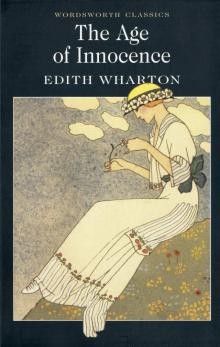 The Age of Innocence
The Age of Innocence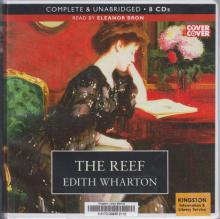 The Reef
The Reef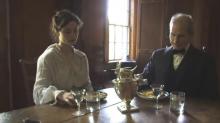 Summer
Summer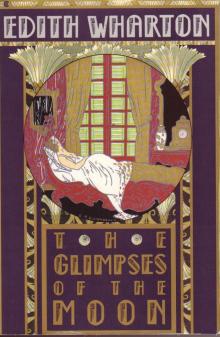 The Glimpses of the Moon
The Glimpses of the Moon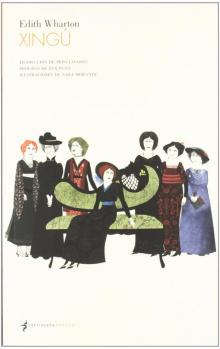 Xingu
Xingu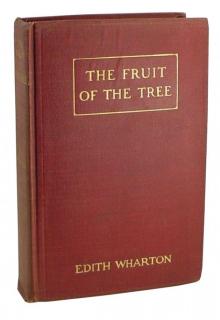 The Fruit of the Tree
The Fruit of the Tree Fast and Loose
Fast and Loose Artemis to Actaeon and Other Verse
Artemis to Actaeon and Other Verse The Line of Least Resistance
The Line of Least Resistance The Lamp of Psyche
The Lamp of Psyche The Reckoning
The Reckoning Afterward
Afterward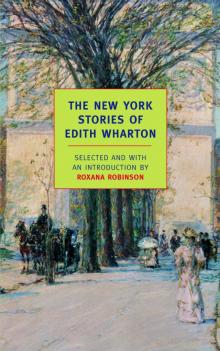 The New York Stories of Edith Wharton
The New York Stories of Edith Wharton The 2014 Halloween Horrors Megapack
The 2014 Halloween Horrors Megapack 'Copy': A Dialogue
'Copy': A Dialogue The Recovery
The Recovery The Fulness of Life
The Fulness of Life Early Short Stories Vol. 1
Early Short Stories Vol. 1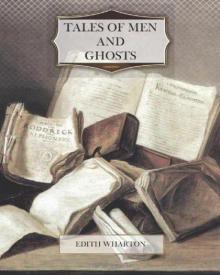 Tales of Men and Ghosts
Tales of Men and Ghosts The House of the Dead Hand
The House of the Dead Hand That Good May Come
That Good May Come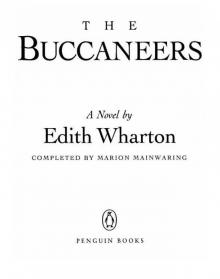 The Buccaneers
The Buccaneers Other Times, Other Manners
Other Times, Other Manners The Hermit and the Wild Woman
The Hermit and the Wild Woman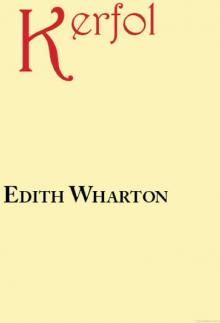 Kerfol
Kerfol The Duchess at Prayer
The Duchess at Prayer Bunner Sisters
Bunner Sisters The Choice
The Choice Madame De Treymes
Madame De Treymes Ethan Frome, Summer, Bunner Sisters
Ethan Frome, Summer, Bunner Sisters In Morocco
In Morocco The Valley of Decision
The Valley of Decision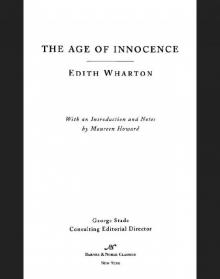 Age of Innocence (Barnes & Noble Classics Series)
Age of Innocence (Barnes & Noble Classics Series) The Angel at the Grave
The Angel at the Grave April Showers
April Showers Sanctuary
Sanctuary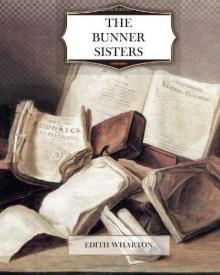 The Bunner Sisters
The Bunner Sisters Mrs. Manstey's View
Mrs. Manstey's View Writing a War Story
Writing a War Story The Custom of the Country
The Custom of the Country In Trust
In Trust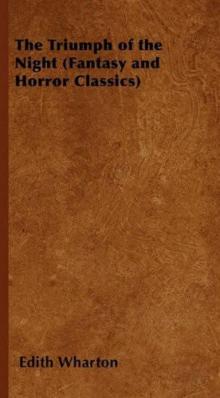 The Triumph of the Night
The Triumph of the Night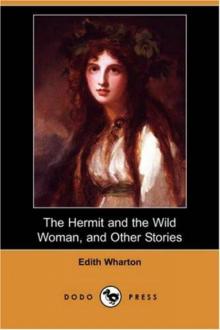 The Hermit and the Wild Woman, and Other Stories
The Hermit and the Wild Woman, and Other Stories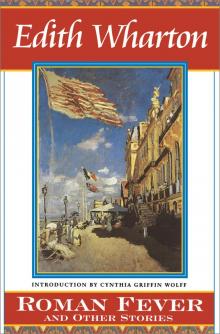 Roman Fever and Other Stories
Roman Fever and Other Stories The Mission of Jane
The Mission of Jane The Descent of Man and Other Stories
The Descent of Man and Other Stories Coming Home
Coming Home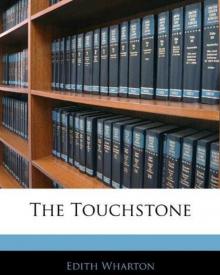 The Touchstone
The Touchstone Early Short Stories Vol. 2
Early Short Stories Vol. 2 Edith Wharton's Verse, 1879-1919, from various journals.
Edith Wharton's Verse, 1879-1919, from various journals.